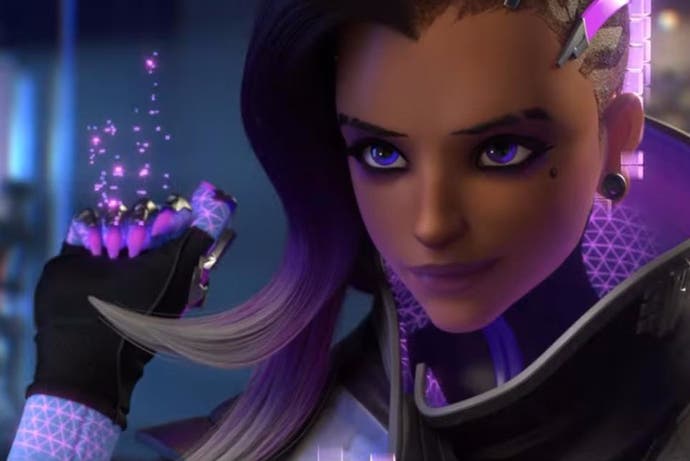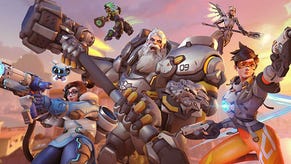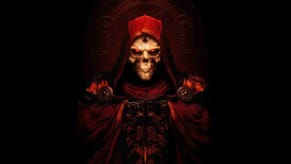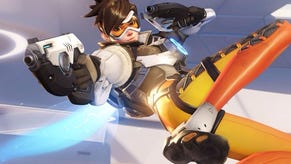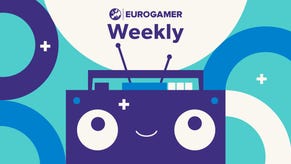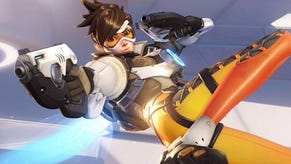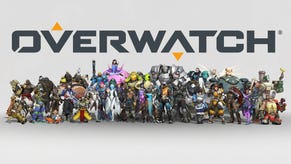Overwatch has become my favourite tawdry soap opera
On the family squabbles, romances and gags that make a great shooter feel special.
Overwatch is a game of Pixar movie sets, complex yet digestible hero classes and chirpy bastard robots who spew bullets into chokepoints till they're eaten alive by Oriental dragons. But above all else, it's a game about family - a family that lives at the intersection between official Blizzard canon and the crude, loopy or touching sitcom sketches, apocryphal romances and in-jokes thrown together by the most besotted Overwatch fans.
That's a disgracefully syrupy angle, a really mushy take on a rigorously built game, but we can all be excused a bit of mushiness at the end of the year, when daylight is a distant memory in more ways than one. And besides, the brilliant thing about Overwatch's family dynamics is that they're also, to a degree, the dynamics of play.
Take Soldier 76, Overwatch's founding member and its go-to Call of Duty guy. When I pick him I'm not just my team's dependable all-rounder but its cranky yet devoted dad - the kind of dad who hides in the garden shed with his radio most weekends but can always be relied on to show up for every last after-school dance rehearsal or, as the case may be, help a wounded Lucio see off a rampaging Roadhog. This is the vision of Jack Morrison that has been handed down by artists like LostInMyMemory - equal parts official backstory and Tumblr gag - and you'll always find him at the heart of the group, keeping everybody on target and intact. Conversely, when I play D.Va I'm Morrison's tearaway brat, a belligerent gamer toddler after the example of the character's legendary gremlin reincarnation who never lets a shot go unanswered and is partial to spamming the bunny emote on top of the payload.
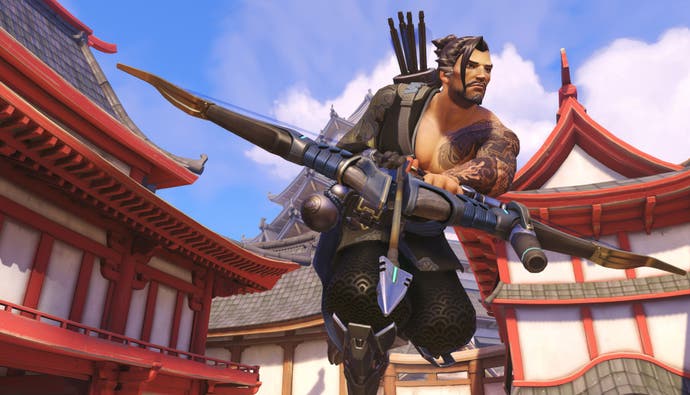
There are many ways to play these classes and I'm not, of course, suggesting that these are the most effective - certainly, my spin on D.Va spends much more time out of her battle mech than in it. Nor would I claim that mine are the definitive interpretations of each character. But these are the representations and approaches that ring truest for me, based on what I've gleaned of each hero's life and times from the copious hints buried in ability sets, map décor and emotes. These are the "whys" that make the "how" of Overwatch so inviting.
Blizzard is hardly unique in fielding a cast of avatars that are at once strongly defined yet ambiguous enough to invite gossip and reinvention - precedents include Valve's long-serving Team Fortress 2 and the Street Fighter series, to say nothing of older Blizzard games. But I think Overwatch is uniquely receptive to such adaptation - among shooters, at least - because the characters are so conspicuously derived from pop culture, rather than steeped in relatively opaque lore like those of Heroes of the Storm. Junkrat is one "what a lovely day" away from a cameo in Mad Max: Fury Road. Winston is that well-worn sci-fi trope, the genetically engineered ape with a heart of gold. Zarya is the bluff, booming Ruskie from the friendlier kind of Cold War movie, and Widowmaker is the femme fatale par excellence with a fondness for slinky PVC and arachnid motifs. You needn't know much about videogames to know, broadly speaking, not just who these characters are but how they'll act when pitted against one another.
You will, however, get so much more out of them if you are a regular trawler of the games community's smellier corners. Overwatch's cast are the stuff of fluffy sitcoms and superhero comics, but they owe as much to review comments threads as shows like Friends or Teen Titans. Reaper, for instance, isn't just a usefully immortal nemesis who can expire bloodlessly in teen-rated trailers, but a prepubescent edge lord spoof - an internet tough guy who secretly wants to be loved. And then there's that mildly terrifying abundance of griefers: the faux-Cockney horror that is Tracer, popping out of quantum flux to shred your rearguard like a high school jock administering a surprise wedgie, or Sombra's face-clawing trick of shutting down your Ultimates in the final 15 seconds. The worst of the lot, of course, is Mei - surely the most depraved and heinous troll ever to emerge from a designer's forebrain, who combines a squeaky-clean earnestness with the ability to lock down control points as a bulletproof ice-cube, and plant a glacier squarely in the path of either team.
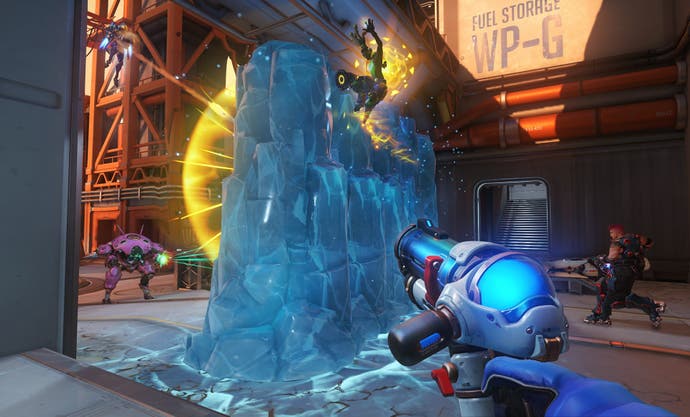
These are more than wonderfully limber ability sets, or punchy pop tributes - they're personalities who should be familiar to anybody who's ever opened a forum thread and thought "god, the state of this". And the result, as in the tawdry yet beguiling 'real-life' dilemmas of a vintage soap opera, is a disarming intimacy. "We see people looking to [soap opera] a lot when they are lonely," observes Allison Eden, assistant professor of media psychology at VU University, Amsterdam. "They have a sort of parasocial relationship with this ready-made group of characters that they can relate to and form judgements about. So it's not like you're friends, but you feel a social connection." I wouldn't call Reinhardt my BFF either but I like to think that, on some level that eludes conscious analysis, he's got my back. Or rather that I have his, because obviously the last place you want Reinhardt to be when things go south is right behind you.
Mileages will vary on the subject of fan-imagined character romances - goodness knows there's a lot of badly drawn porn to sift through if this side of the DeviantArt scene appeals. But I do like the idea of Pharah and Mercy being sweethearts, in part because it made things so beautifully awkward when Blizzard added Pharah's stern old mum Ana to the roster, and in part because it chimes with how often these characters are found together in battle. Pharah always has the luxury of height, after all - if you're playing Mercy and you're short of something to hide behind, a solid escape strategy is to set your adoring eyes on her rocket-propelled tukus and reel yourself out of harm's way.
Overwatch's friendliness, the Justice-League-meets-Archer bonhomie of its cast, is critical to its lasting appeal. It's also the necessary if imperfect antidote to its pervasive nihilism - a nihilism it shares with most shooters, rendered more conspicuous by all the things it doesn't. The characters and writing lend a rosy glamour to some well-worn mode setups, but every so often the music falters and you remember that you're basically just capturing territory or protecting commodities according to the usual, chilly military FPS logic of might-equals-right. Much as I love the game, Overwatch can feel even more bleak of worldview than Tom Clancy's The Division because its wide-eyed hopefulness is so out of synch with (or perhaps, camouflage for) its status as a tacit vigilante sim whose primary loyalties are to property and conquest.
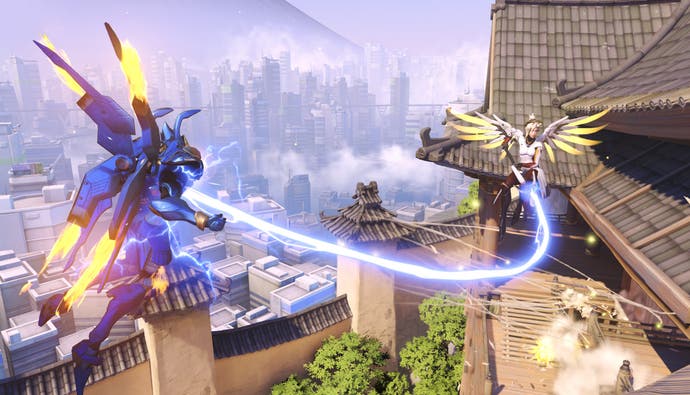
It's also a game that, in transporting you across the globe, cheerily borrows and merges historically fraught motifs in the name of cute unlockable outfits or picturesque map backdrops. There's no harm intended on Blizzard's part, but I'm not sure that'll be much consolation to, for instance, a person of Polynesian ancestry irked by the surfer-shack blurring of "islander" influences in Roadhog's alternate skins. And then there's that slight but conspicuous partiality for nubile, cute-as-a-button female characters and craggy older men (Blizzard has, it should be noted, evened things out with the introduction of butt-kicking grandma Ana). None of this is a reason to despise Overwatch, but all of it deserves to be acknowledged - every family has its skeletons in the closet.
Overwatch's cast are among the few video game characters I can imagine living lives outside their game. You can picture them all getting together after a close-fought match for sodas at the diner on Route 66, or rocking up to the arcade on Hanamura - D.Va throwing a tantrum because Sombra hacked the King of Fighters cabinet, while Lucio takes all comers on the Dance Dance Revolution mat. You can imagine the estranged Shimada brothers glaring at each other like cats while Winston tries to break the ice with a dismal joke about banana splits. You can imagine Mercy bumming a clandestine smoke off McCree, and Reinhardt seriously regretting challenging Zarya to an arm wrestle.
You can imagine them all bidding each other goodnight outside the attacker's spawn on King's Row - Widowmaker and Symmetra flouncing off to some high-end singles bar while Torbjorn and Tracer make a beeline for the nearest real ale pub, and Soldier 76 growls at Mei to stop screwing around and put her mittens on. Cosy daydreams of this sort are why Overwatch is my game of the year. It's rare to run into a shooter, let alone a multiplayer-only shooter, that is so frenetic and yet so friendly.
